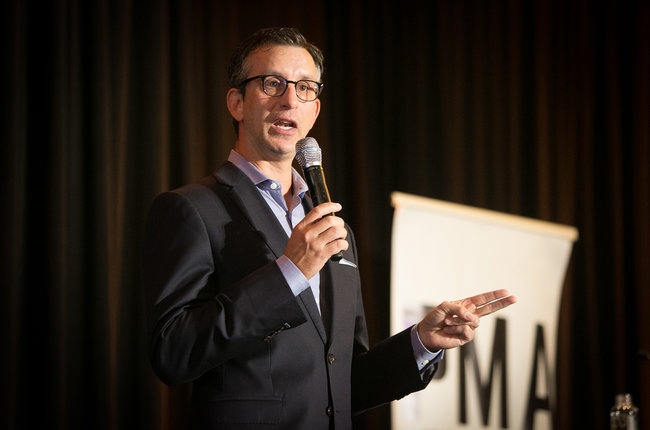Currently celebrating its 20th anniversary, the Production Music Association (PMA) is wrapping its fourth annual Production Music Conference (Oct. 4-6) at the Loews Hollywood Hotel. In keeping with its 2017 theme -- “Building on the Past, Defining the Future” -- the conference features another day-long series of forward-thinking sessions today (Oct. 6).
Kicking off the slate is a keynote address by Academy Award-winning film composer Mychael Danna (Life of Pi, Little Miss Sunshine and The Ice Storm). From there, attendees can choose from a diverse lineup of panel sessions that include “The 4 M’s: Music, Metadata, Marketing and Money,” “Writing a Production Music Hit!: 10 Elements Every Track Must Have” and “Turning Riffs into Revenue: Marketing Production Music in the Digital Age.”
One of PMC 2017’s highlights the day before was the keynote speech by David Israelite, president/CEO of the National Music Publishers’ Association (NMPA). He opened his hour-long talk with the mention of a “very disturbing trend” that’s happening in the production music industry.
“Your licensees are starting to take what I would call morally questionable positions with regard to their requests about what you must give them in order for them to use your music,” Israelite told the 400-plus people in attendance. Examples of these “morally questionable positions” being taken by networks and motion picture studios include asking creators to give the latter entities partial credit for the composition itself.
“Our best weapon against this type of practice,” said Israelite, “is exposure. It’s public pressure on these companies that are basically asking creators to pretend that somehow the motion picture studio or the network had anything to do with the creative process and therefore deserves any of the downstream performance money. You’re being put in a situation that’s blackmail. And that’s not a fair choice for you to have to make.”
Noting the need to do a better job of putting the brakes on this growing trend, Israelite said that he has spoken to the heads of ASCAP, BMI, SESAC and GMR (Global Music Rights). “We are all committed to looking at ways to help stop this practice,” he added as the audience erupted into loud applause.
Israelite also talked about his concern that the music industry is letting other issues distract it from the true battle that needs to be waged over the value of music. “We as an industry are bad at this,” he explained. “And what I’m going to say will probably piss some people off. But the value of our music is more important than the process by which we license it. The licensing system is broken. We’ve got to get our crap together.”
Further underscoring music’s value, the NMPA chief also shared findings from a four-year study showing that total U.S. music revenues have risen from $2.2 billion in 2013 to $2.7 billion in 2016. And 2017 is on course to sustain that upward momentum. Broken down by sector, performance accounts for 54 percent, followed by sync (21 percent), mechanical (19 percent) and other (6 percent).
One of the noteworthy panels following Israelite’s keynote speech explored the notion of production music doubling as an outlet for artist development. Moderated by Konsonant Music creative director Andrew Gross, “Production Music Is the Record Industry: New Avenues for Artist Development” helped dispel long-held perceptions about this particular industry segment.
“Production music isn’t one thing anymore,” said singer/songwriter/composer Gingger Shankar of the increasing blurring of the lines between it and its popular music counterpart. Shankar composed the track “Instagram Hype,” which has since become a popular music track beyond its initial use by the social media service. She also spoke about having formed a collective with fellow indie musicians to build a production library of 1,500 tracks from music left over from their various projects.
As an outgrowth of his ongoing production music work, singer/songwriter/producer Paul Otten and his writing partner, Canadian singer/songwriter Helen Austin, have also morphed into the folk/pop duo Big Little Lions, which, in addition to recently wrapping a tour in Canada, has released an EP. Noted Otten of peers’ misperceptions of the production music arena: “We don’t write jingles.”
PMC '17 kicked off its fourth annual confab with its third Mark Awards (Oct. 4). In addition to presenting awards in 28 categories, the ceremony saluted three special honorees. Italian music industry veteran Romano Di Bari, founder of Flippermusic Publishing, received the Hall of Fame Award; Alison Smith, BMI executive vp of distribution, publisher relations & administration services, took home the Ambassador Award; and the Visionary Award was given to Dr. Lynne Lummel. Now retired from ASCAP after 28 years, Lummel most recently served as the organization’s executive vp and chief transformation management officer.
Founded in 1997, Los Angeles-based Production Music Association is headed by chairman Adam Taylor, who is also the president of APM Music.








